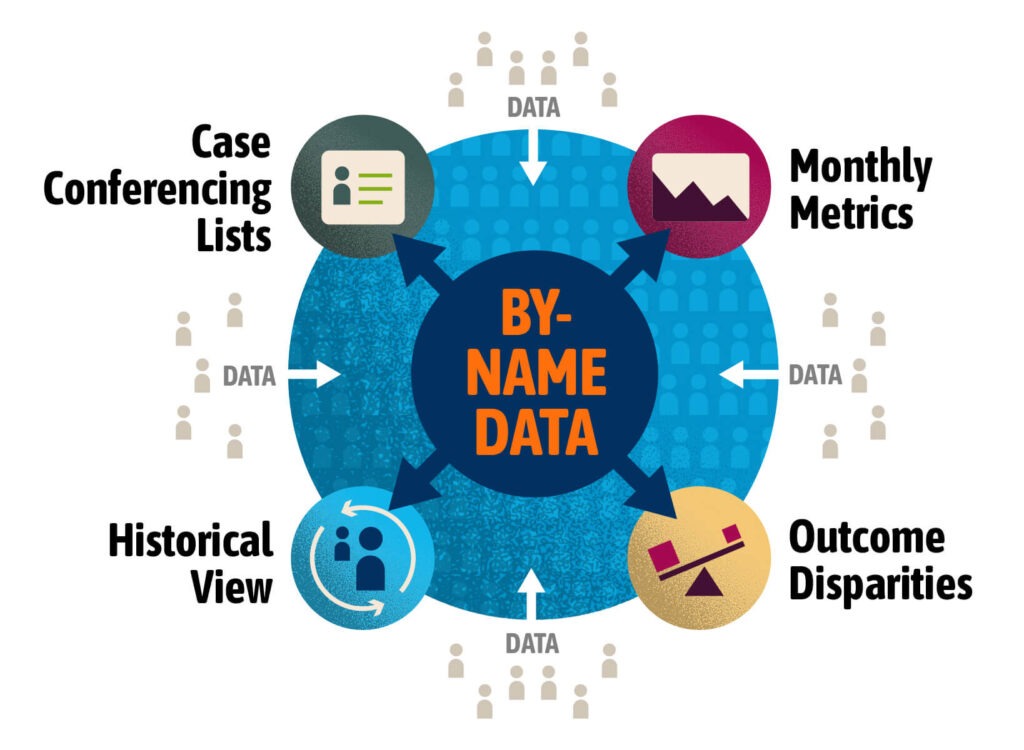Introduction
The Single Adults Quality Data Toolkit
The Single Adults Quality Data Toolkit outlines Built for Zero’s (BFZ) Quality Data standard and offers self-guided resources that any community can leverage to achieve Single Adult Quality Data locally. This toolkit addresses Quality Data standards for single adult households experiencing literal homelessness. A Youth Quality Data Toolkit and a Family Quality Data Toolkit are still in the planning phases of development.
The toolkit is organized into sections that correspond to the Single Adults Scorecard. These sections represent key elements of local homeless response systems that BFZ has identified as essential for maintaining a comprehensive, reliable, and regularly updated by-name dataset. For each section, the toolkit includes:
- an overview of the main themes, an explanation of why improving each area is essential for the homeless response system, and examples of how each area can be put into practice.
- the corresponding scorecard questions.
- tools and resources designed to support communities to address each of the scorecard questions in the section.
- case study examples of how BFZ communities have addressed the core concepts of each section.
Data Contribution
Outreach Coverage
Questions 1A, 1B, 1C, 1D
Provider Participation
Questions 2A, 2B, 3A, 3B, 3C, 3D
Policies and Procedures
Data Infrastructure
Tracking List Statuses
Questions 7, 9, 10, 11A,
11B, 12C
Tracking Population Statuses
Questions 11C, 12A, 12B,
12D, 12E
The theory behind Quality Data
BFZ’s methodology is based on the idea that to build systems that can prevent, quickly detect, and permanently resolve homelessness, you need five things:
- a shared definition of the right end-state
- an accountable community-wide team
- real-time data, which accounts for everyone by name and need (by-name data)
- centering of equity
- targeted and data-driven housing investments
This toolkit focuses on helping communities create the systems necessary to have a by-name dataset that accounts for every single adult experiencing homelessness by name and need.
How does BFZ define by-name data?
By-name data (sometimes referred to as a by-name list) is a comprehensive dataset of every person in a community experiencing homelessness, updated in real-time. Using information collected from across the homeless response system, each person in the dataset can be accounted for by name (or ID), household status, homeless history, and more. This data is updated monthly, at minimum, and can be used to develop a case conferencing list, report monthly BFZ metrics, build a historical view of the system, and analyze outcome disparities.

How to use this toolkit
The information and resources in this toolkit can be used to work through each of the Single Adult Scorecard questions, toward the Quality Data milestone, or to focus on select areas for system improvement. It is recommended to start by reviewing the overview page of each section to better understand the related definitions, rationale, and application of each topic area. The tools, resources, and case studies will help your team implement each area locally.
BFZ has established standards to verify that a community has achieved Quality Data, which includes completing the scorecard and other quantitative measures. Find out more about the standards on the Single Adults Quality Data Standards page.
Are you a BFZ Community?
Not a BFZ Community?
Submit Questions or Feedback
We want to hear from you! Let us know if you have specific feedback, comments, or questions about the material on this page.
Submit Questions or Feedback
We want to hear from you! Let us know if you have specific feedback, comments, or questions about the material on this page.

